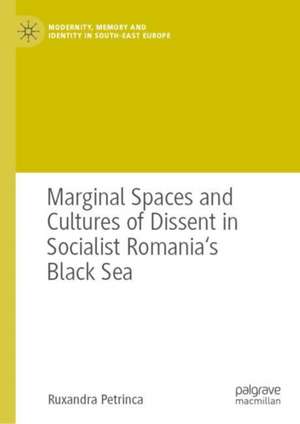Marginal Spaces and Cultures of Dissent in Socialist Romania's Black Sea: Modernity, Memory and Identity in South-East Europe
Autor Ruxandra-Iuliana Canacheen Limba Engleză Hardback – 7 sep 2023
Din seria Modernity, Memory and Identity in South-East Europe
- 17%
 Preț: 523.81 lei
Preț: 523.81 lei - 15%
 Preț: 702.05 lei
Preț: 702.05 lei - 15%
 Preț: 471.69 lei
Preț: 471.69 lei - 15%
 Preț: 502.54 lei
Preț: 502.54 lei - 15%
 Preț: 584.26 lei
Preț: 584.26 lei -
 Preț: 380.84 lei
Preț: 380.84 lei - 18%
 Preț: 780.37 lei
Preț: 780.37 lei - 18%
 Preț: 786.36 lei
Preț: 786.36 lei -
 Preț: 386.81 lei
Preț: 386.81 lei - 15%
 Preț: 499.59 lei
Preț: 499.59 lei - 18%
 Preț: 892.11 lei
Preț: 892.11 lei - 15%
 Preț: 581.14 lei
Preț: 581.14 lei - 18%
 Preț: 887.68 lei
Preț: 887.68 lei - 18%
 Preț: 780.82 lei
Preț: 780.82 lei - 15%
 Preț: 698.80 lei
Preț: 698.80 lei
Preț: 643.16 lei
Preț vechi: 756.65 lei
-15% Nou
Puncte Express: 965
Preț estimativ în valută:
123.12€ • 126.70$ • 103.79£
123.12€ • 126.70$ • 103.79£
Carte tipărită la comandă
Livrare economică 28 februarie-14 martie
Preluare comenzi: 021 569.72.76
Specificații
ISBN-13: 9783031357985
ISBN-10: 3031357981
Ilustrații: XX, 265 p. 15 illus., 11 illus. in color.
Dimensiuni: 148 x 210 mm
Greutate: 0.49 kg
Ediția:1st ed. 2023
Editura: Springer International Publishing
Colecția Palgrave Macmillan
Seria Modernity, Memory and Identity in South-East Europe
Locul publicării:Cham, Switzerland
ISBN-10: 3031357981
Ilustrații: XX, 265 p. 15 illus., 11 illus. in color.
Dimensiuni: 148 x 210 mm
Greutate: 0.49 kg
Ediția:1st ed. 2023
Editura: Springer International Publishing
Colecția Palgrave Macmillan
Seria Modernity, Memory and Identity in South-East Europe
Locul publicării:Cham, Switzerland
Cuprins
1. Permeable Borders, Geographical Markers, and Ethnic Diversity in Dobrogea.- 2.Varieties of Socialist Tourism: Individual and Communal Vacations on the Southern Shores of the Black Sea.- 3. Locality and Community: Landscape, Temporality, and Transformation.- 4. Supervision, Transgression, and Co-Habitation: The Secret Lives of Liminal Spaces.
Notă biografică
Ruxandra-Iuliana Canache is a postdoctoral fellow at the Research Institute of the University of Bucharest and a researcher at the Museum of Communist Horrors in Romania.
Textul de pe ultima copertă
This book analyzes two Romanian villages – 2 Mai and Vama Veche – as spaces of relative freedom during the last decades of socialist rule. This microhistorical study refutes simplistic views of the communist past which focus on political figures and events, and instead explores ordinary people and everyday life. Taking a multidisciplinary approach, it considers a broad range of sources, including official Communist Party documents, secret police files, personal memoirs, oral history interviews, ethnographic films, songs, and artistic performances. This book intertwines three narrative threads: that of the visitors (mainly members of the Romanian intelligentsia, young people, and hippies); that of the local inhabitants; and that of 'authority' (local and central state agents actively engaged in surveillance and supervision). In doing so, it interrogates the spectrum of consent/dissent and resistance/collaboration hitherto neglected in scholarship.
Ruxandra Petrinca is a postdoctoral fellow at the Research Institute of the University of Bucharest and a researcher at the Museum of Communist Horrors in Romania.
Caracteristici
Provides a microhistory of two Romanian villages during the last two decades of socialist rule Explores the relationships among residents, visitors, and the authorities Interrogates a wide range of sources, from state archives to oral history interviews
